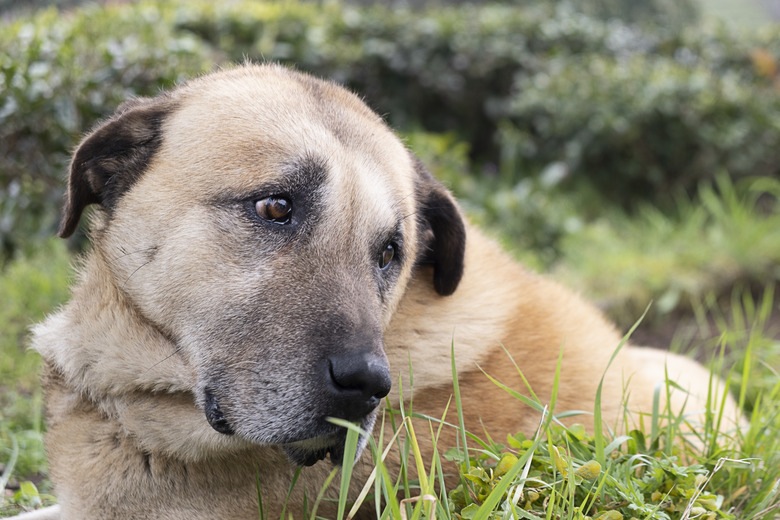Over-The-Counter Cough Suppressant For Dogs
A dog's cough can be indicative of a serious disease. However, dogs can cough for other reasons too, such as allergens in the air or kennel cough. In such cases, an over-the-counter (OTC) cough suppressant might be appropriate to control coughing. Cough suppressants should never be used by dogs who could possibly have pneumonia or congestive heart failure. Only a veterinarian is qualified to examine and diagnose your pet to determine if they have these or other medical conditions. Always have your dog examined by a veterinarian before starting any treatments on your coughing dog.
Can you give a dog cough medicine?
Can you give a dog cough medicine?
You can give your dog cough medicine if your veterinarian recommends it. Robitussin DM is sometimes recommended for dogs due to accessibility. But before a dog receives any sort of cough medicine, a complete physical exam should be done by your veterinarian. Just because a drug is available over the counter doesn't automatically mean it is safe for your dog.
Over-the-counter cough medicines may not be safe for use in dogs on the following medications:
- Monoamine oxidase inhibitors (MAOIs)
- Sedatives
- Antihistamines
- Narcotics
- Central nervous system depressants
Cough medicine should not be given to dogs with a chronic cough except on the order of your veterinarian. It should also not be given to dogs with pneumonia or congestive heart failure.
Can you give dextromethorphan cough medicine to a dog?
Can you give dextromethorphan cough medicine to a dog?
If your veterinarian recommends dextromethorphan for your dog, then yes, you can give it to them. Dextromethorphan works by suppressing the cough center in the brain. But just because it is available over the counter for human use does not automatically make it safe for use in all dogs.
Your dog should not take dextromethorphan if any of the following applies to them:
- They have a chronic cough, like chronic bronchitis
- Heart disease
- Liver disease
- Pneumonia
- Dogs under 4 months of age
- Nursing or pregnant dogs
There are over 300 drugs that are known to interact with dextromethorphan in humans, so in the interest of safety these combinations should be avoided for animals as well. Dogs on any of the following medications should not take dextromethorphan without veterinary supervision:
- Amitraz tick collars
- Amitriptyline
- Buprenorphine
- Butorphanol
- Veterinary CBD products
- Chlorpheniramine (Chlor-Trimeton)
- Cimetidine (Pepcid AC)
- Diazepam
- Diphenhydramine (Benadryl)
- Dimenhydrinate (Dramamine)
- Gabapentin
- Hydrocodone
- Phenobarbital
- Selegiline
- Tramadol
Since this is not a complete list of drugs that can cross-react with dextromethorphan, talk with your veterinarian about any supplements and medications your dog is on before starting any over-the-counter medication.
What cough suppressant is safe for dogs?
What cough suppressant is safe for dogs?
There is no one cough suppressant that is safe for all dogs. Dogs over 4 months old who have a dry, nonproductive cough (that is not chronic) may sometimes be treated with over-the-counter dextromethorphan. Robitussin DM is usually the OTC cough medication that would be recommended.
Read the list of ingredients (particularly the active ingredients). There should only be one active ingredient, which is dextromethorphan. If your veterinarian OKs the use of guaifenesin (an expectorant, which helps bring up mucus), this may be another active ingredient listed. Do not get cold and flu formulations; formulas with acetaminophen or alcohol; or fast-release, extended-release, or nighttime formulas.
Another safe option for cough relief is Cough Tablets For Dogs and Cats made by Creative Science, which contains dextromethorphan and guaifenesin. This option is safer than OTC options because it's formulated for pets. There are also prescription cough suppressants that your veterinarian can prescribe. These include butorphanol and hydrocodone. Never give your dog hydrocodone that was prescribed to a human, as it may contain acetaminophen, which can be toxic to dogs.
Antihistamines, such as diphenhydramine, can be used to treat minor coughs associated with airborne allergens. Benadryl is a commonly used antihistamine for treating dogs with allergies and allergic reactions. Dogs should not take both Benadryl and dextromethorphan unless directed to do so by your veterinarian.
Over-the-counter kennel cough medicine
Over-the-counter kennel cough medicine
Kennel cough (infectious tracheobronchitis) is a catch-all term for an infectious disease that causes inflammation in a dog's trachea and bronchial tubes. The disease can cause:
- A hacking, gagging cough
- Lethargy
- Sneezing
- Loss of appetite
- Swollen tonsils
Kennel cough can be caused by a virus or a bacterium. It generally does not need treatment and will usually resolve on its own in one to three weeks. A cough suppressant can be useful when a dog's cough is severe enough or frequent enough to interfere with their ability to rest.
While a cough suppressant can help a dog be more comfortable during recovery, it only treats the dog's symptoms. A cough suppressant does not cure kennel cough. It should not be used in dogs who have a productive cough.
How do I give cough medicine to my dog?
How do I give cough medicine to my dog?
- Measure out the liquid: Use a syringe (without the needle) from your veterinarian or use a measuring teaspoon. Some products also come with a small dosing cup.
- Administer the medicine: Using a syringe (or a dropper), put the tip at the corner of your dog's mouth and squirt in the liquid. Don't mix cough medicine into your dog's food, as they will likely refuse to eat it. Over-the-counter cough products are designed to be appealing to human tastes, not dogs.
- If you're giving a tablet: Put it in a pill pocket or in a small meatball made with canned dog food. Don't give your dog the pill dry because that may aggravate their cough, making it hard to swallow the medicine.
How long can a dog take cough suppressants?
How long can a dog take cough suppressants?
Generally, a dog should not take a cough suppressant for more than seven days unless specifically directed to do so by their veterinarian.
However, dogs with a collapsed or collapsing trachea may need to be on long-term cough medications. These dogs need a prescription cough suppressant, such as Torbutrol (butorphanol) or hydrocodone rather than an over-the-counter product. They may also be treated with anti-inflammatories and bronchodilators, like theophylline.
Tracheal collapse is a genetic disease that is common in small dogs, like Yorkies, and they are born with it. These dogs have weak cartilage in their trachea, which can cause it to partially collapse down on itself. This produces a chronic honking cough which may result in ulcers within the dog's trachea. The severity of the disease can change over time with age. Obesity can make the cough worse, as can other health issues, like airborne allergies and kennel cough.
Dog cough medicine side effects
Dog cough medicine side effects
Some potential side effects of dog cough medicine include:
- Excitement
- Nausea
- High blood pressure
- Dizziness
- Drowsiness
- Reduced rates of breathing
These side effects are the main reason why OTC cough medicines are not commonly recommended for pets. It's also possible for dogs to become addicted to dextromethorphan, so use it cautiously.
Talk to your veterinarian about giving a dog cough medicine
Talk to your veterinarian about giving a dog cough medicine
If your dog is coughing for more than a day or if their symptoms grow worse, consult your veterinarian for an updated diagnosis. Chronic coughs lasting for a week or more might be a symptom of other lung, airway, or heart disease. Dogs who have severe cases of kennel cough may need antibiotics and nebulization to help recover from their cough. Antibiotics do not directly treat the cough but might be necessary to treat secondary infections as a result of the cough.
The bottom line
The bottom line
The over-the-counter cough medicine Robitussin DM (dextromethorphan) should only be used if your veterinarian directs you to do so. Not all dogs can safely take this medication. Dogs with health conditions, like congestive heart failure, should not take it. Dogs on certain medications, like tramadol, should also not receive dextromethorphan. If your dog has cough symptoms, talk with your DVM to get more information on which meds are right for your pet. In some cases, one of the prescription cough medicines used in veterinary medicine may be needed to treat your dog.


